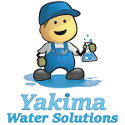Common well water problems in Yakima, Sunnyside, Ellensburg and surrounding areas. Yakima Water Solutions can solve these problems.
Iron
Iron can cause a “rusty” taste in ground water, and it can stain pipes and clothing. Most ground water has some amount of iron in it. It comes in contract with minerals underground that contain iron. Treatment methods include installing a water softener, and aerating the water (adding oxygen). Yakima Water Solutions offers custom iron treatment equipment to meet your specific needs.
Rotten Egg Odor
A “rotten egg” smell indicates the presence of hydrogen sulfide gas, which comes from sulfur. Sulfur can occur in two forms: sulfides and sulfates. Sulfides are usually found in marshes and manure pits, while sulfates often come from the dissolving of minerals, such as gypsum and anhyrdite.
Along with an unpleasant odor and taste, sulfides can cause corrosion to plumbing and darken your water. Treatment methods include aeration, chlorination, reverse osmosis, or ion exchange.
Acidic Water
Not treated, this condition will cause corrosion in copper plumbing, indicated by a blue-green stain. Since well water in our region has no raw copper in it, when this stain appears, we must neutralize it. Neutralizing will prevent the copper pipes from breaking down and allow iron filtration to be more effective.
Staining
Color staining generally tells us what problem our water has. Blue-green indicates a low Ph, breaking down copper pipes. Red or rust indicates iron. Black may indicate manganese or sulfur. These problems can be treated with a good filtration system. White indicates hardness, calcium and magnesium, and sometimes silica. A water softener will usually solve this problem.
Hard Water Spotting
Water hardness is the most common problem with ground water. It is generally associated with an abundance of calcium and magnesium. Left untreated, it may cause soap curds to form on pipes and other plumbing fixtures. Treatment is a water softener which removes calcium and magnesium.
Bacteria
Coliforms are naturally present in the environment. Fecal coliform and E. coli are only found in human and animal fecal waste.. Testing is the only reliable way to know if your water is safe. You cannot tell by the look, taste, or smell of the water if disease-causing organisms are in it. If coliform bacteria are present in your drinking water, your risk of contracting a water-borne illness is increased. Although total coliforms can come from sources other than fecal matter, a positive total coliform sample should be considered an indication of pollution in your well.
Late spring or early summer are the best times to test your well, since coliform contamination is most likely to show up during wet weather. Whether your test results are positive or negative, understand that the sample you collected is just a “snapshot” of your well’s water quality. The more samples you have tested, the more confident you can be about the quality of the water you are drinking.
Contact us to learn more about collecting samples and sample bottles.
Nitrates
Nitrates and nitrites are nitrogen-oxygen chemical units which combine with various organic and inorganic compounds. The greatest use of nitrates is as a fertilizer. Once taken into the body, nitrates are converted to nitrites. Infants below six months who drink water containing nitrate in excess of the maximum contaminant level (MCL) could become seriously ill and, if untreated, may die. Symptoms include shortness of breath and blue baby syndrome. The major sources of nitrates in drinking water are runoff from fertilizer use; leaking from septic tanks, sewage; and erosion of natural deposits.
Yakima Water Solutions has experience solving nitrate problems in Sunnyside and Outlook. We can test your water for free and give you treatment options.
